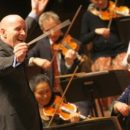Leontyne Price, the revered American opera singer, turned 90 last week. Springfield Symphony Orchestra Conductor Kevin Rhodes has been itching to find a way to celebrate her brilliant career. He’s doing it, at last, Saturday evening.
In her prime, Leontyne Price’s voice was as big as she was a star. Performers who shared the stage with her described it as an avalanche of sound, a cloud filled with silver.
She’s a grande dame of opera — some would argue the grand dame. And to become that as an African-American woman whose career began taking off in the mid-1950s is one of the things Rhodes admires tremendously about Price.
“You oftentimes hear the phrase that performers, artists — whatever — are ‘fragile people’,” Rhodes said in an interview this week. “And this is really quite true because every time we go on stage we put ourselves out there, and anybody can just totally ruin our month with the wrong comment.”
And Price had the “wrong comment” directed at her often. When she played her first televised appearance as Tosca in 1955 opposite a white tenor, nearly a dozen stations refused to broadcast the performance. And later, as an established star, she continued to experience segregation in hotels and restaurants.
“That she didn’t let any of that stop her from becoming one of the reigning artists of the 20th century, that is — for me — an amazing comment, when you talk about her emotional strength,” Rhodes said.
Rhodes for years has been wanting to pay tribute to that strength, and to Price’s incredible musical accomplishments.
“Every note that she produced was infused with thought, with love and with meaning, and this is what made her so special to me,” he said.
She’s also special to soprano Othalie Graham, whom Rhodes tapped to perform some of Price’s career-defining arias.
Like Price, Graham has a regal bearing and a voice that she herself describes as “enormous.” She’s also black, and said she wants to honor Price for paving the way for singers of color.
“For me, she really is what we all aspire to be,” Graham said. “Not only an incredible artist, a beautiful woman, an important role model for every singer — not just every African-American or black singer — but a really important part of our American history.”
As a girl, Graham’s music teachers noticed her big voice and steered her toward opera. She’d seen and loved Leontyne Price on TV, mainly in commercials for the United Negro College Fund.
When Graham’s father noticed Price was coming to perform in Toronto near their home, he bought tickets for Graham and her mother. A teenager at the time, Graham brought flowers to present to the diva after the performance. But Graham didn’t know about encores.
As Price exited the stage, “I thought, ‘Oh, no! She’s finished. That’s it!'” Graham remembered. “So I rushed forward with my flowers in front of the entire audience. I ran down the aisle, [saying] ‘Miss Price, Miss Price, I have flowers for you!'”
Price looked down — a long way from the stage to the floor — and asked, “Are those for me?”
Price took them and asked, “What would you like to me sing?”
As the audience screamed out requests, Graham said she wanted to hear the one aria she knew, from the death scene in Madame Butterfly.
“She said, ‘You stand right there,” Graham recalled. “And I stood right there in front of the stage. She walked off, came back and she sang it.”
A few decades later, Graham and Rhodes hatched the idea to work together on this program celebrating Leontyne Price’s life and legacy.
But Graham said she will “absolutely not” try to play the role of Price on stage.
“I mean, as a singer — as a younger singer especially — just the idea of that is unfathomable,” Graham said.
Leontyne Price won’t be in Springfield for the performance Saturday evening. A symphony spokeswoman said Price isn’t well enough to make the trip.
And if the legendary singer could attend?
“I think I would faint and not be able to sing at all!” Graham laughed.
“Right! Right!” Rhodes added. “Thank goodness she’s not there, right?”

